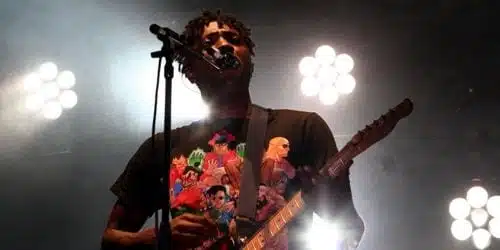
Bloc Party currently carry a strange aura that makes them seem as though they were always a big band, yet their last two albums were far inferior to their acclaimed debut so it is somewhat surprising to see them outlasting and outgrowing many of their contemporaries. With their slick, yet edgy, guitar licks, however, and thumping rhythm sitting behind a brooding but intensely charismatic front man, it is not terribly difficult to grasp the group’s appeal. Every new trip through Chicago has seen the band ascend one more step up the musical ladder. This time around it was the sudden shift in venue from the respectably sized Riviera Theatre to the imposing Aragon Ballroom, which must be double in size — and if they didn’t sell the place out they were close.
After an unusually long delay, which saw restless energy amongst the crowd slowly turn into chanting, the house lights eventually dimmed. All that remained was a muted wall of light permeating from the back of the stage, a sort of subtle introduction to the light show that would follow (the less subtle introduction for this were signs posted throughout warning “Strobe lights will be used extensively during tonight’s performance.”) An ambient instrumental piece — played over the PA — followed. It would have been an extremely striking entrance had the band kicked directly into the first song rather than turning the house lights back on as they sauntered out onto the stage. But before there was even time to reflect on the missed opportunity the band acknowledged the ecstatic audience and jumped quickly into “One Month Off”, which seamlessly morphed into “Trojan Horse”.
Artist: Bloc Party
Album: Intimacy
Label: Vice
Image: http://images.popmatters.com/music_cover_art/b/blocparty-intimacy.jpg
US Release Date: 2008-10-28
UK Release Date: 2008-10-27
Internet release date: 2008-08-21
Both of the opening songs are from the band’s latest release, Intimacy, and are reflections on a relationship, yet they come from very different mindsets; one a seething indictment on a relationship at its bitter end, while the other a more sentimental musing filled with regret. The themes of the songs, and the title of the album that bore them, may allude to a more intimate opening, but it wasn’t so. The songs, especially coupled together, set a frenetic pace for the opening of the show and it wasn’t until “Positive Tension”, from the bands first record Silent Alarm, that the energy between the crowd and band seemed to coalesce. It may have been the slowly building, tension filled verse, which allowed the audience to catch up before the band burst into the heavy chorus that characterizes the song.
Over the next few songs it became apparent that the band’s albums did not hold the clues as to the band’s success; it was in their live show. The young band is completely at home playing in front of large crowds, with the oversized flashing light show matched by the huge sound, which even managed to fill the vacuous Aragon ballroom space. And then, of course, there is lead singer Kele Okereke. The energy the band puts forth in their live show falls largely on the shoulders of Okereke, which he handles with ease. Not to diminish the rest of the band (over the years their stage presence has slowly came into its own), but, truth be told, there simply isn’t enough room for another bold personality on stage.
To the band’s credit, musically they appear to be pushing in new directions. They don’t seem entirely content sticking to one formula, even if that formula has proven successful. Towards the end of the set the band rolled out “Mercury”, one of the more experimental tracks from their new album, which started with Okereke putting his guitar away for the first time and ended with him on his knees tinkering with a looped sample of his vocal atop of some up-tempo drums. More importantly, the song revealed what is at the core of the band’s success. With “Mercury”, they were able to take one of the more grating and forgettable tracks from their new album and turn it into one of the more memorable pieces of the evening. In fact, several factors that work against them on record actually manage to work in their favor live. The band’s schizophrenically shifting styles keeps things interesting, while Okereke’s vocals, which typically wear very thin by the end of an LP, become a lighthouse of sorts — a constant one can turn to as everything else grows dark. Finally, the slick album production, which tends to soften any sharp corners, is stripped away in the live environment, giving the songs some dynamic highlights that were absent before. “Helicopter”, from the band’s first album, closed the show. When juxtaposed against much of Bloc Party’s later material, the prominent snaking guitar had the effect of a razor blade slicing through the air. This closing number reiterated the fact that the band’s best material can still be found on their first album, which suggests that — despite having to work their way up to venues of this size — Bloc Party has possibly always been a big band
